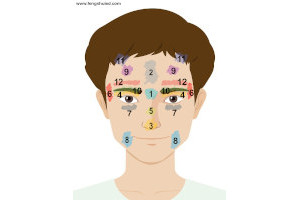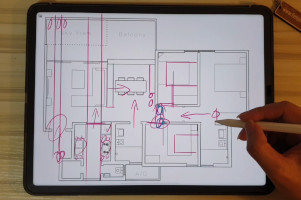If you have been researching feng shui for a while, whether as a beginner or not, you’d probably don’t need any reminders that feng shui has nothing to do with religion.
But the fact is that ancient Chinese culture has a strong connection to the gods.
And the ancient practice of feng shui does incorporate religious beliefs into home design and furniture placement,
It’s not that religion has become one with feng shui. It’s just that a lot of feng shui practiced in the past accounts for appeasing the gods so that a homeowner does not bare the brunt of their divine wrath.
A lot of feng shui practitioners continue to try to delink feng shui from beliefs and religion. It is right to say that feng shui has nothing to do with religion.
But surely you must have heard about the trinity of luck which consist of heaven luck, earth luck and man luck.
Bazi is about heaven luck, feng shui takes care of earth luck, spirituality concerns man luck. And religion together with symbolism falls into this category of man luck.
Claiming that beliefs have nothing to do with feng shui is like saying bazi has nothing to do with feng shui. It is technically right to say that, but they are all branches sprouting from the same tree.
It’s like saying the tire and rim are not the same. But you don’t need to be a genius to realize that they both play a critical role in putting a functioning wheel together.
Having said that, do be mindful that religion is just a route to spirituality. One can be spiritual without a god to believe in.
Even today, feng shui in various parts of Asia are practiced by people who are religiously aligned with Taoism and Buddhism.
In many ways, these two religions might not even have to be considered as religions. But as a way of life.
This is why even when Taoism is not popular in the west, a lot of media publications talk about the “Way” of something. This is a reference to the teachings of Taoism… as a way of life.
This can also be observed in various books where authors and publisher go with book title starting with “The Way Of…” something.
Whether you are setting up a Christian, Taoist or Buddhist alter at home, there are some general guidelines about altar placement that you can use as a guide in setting up the altar.
I say “as a guide” because you can choose to follow them or not. I’m nobody to tell you how you should worship your god.
But grandmasters who have practiced feng shui for decades have long accounted for this issue. And here are some of the suggestions that have been passed down in terms of the placement of the altar.
2 big rules
There are two main guidelines that overrule everything else with regards to placement.
It has no bearings on directions, numerology or where is the wealth location.
And that is that the altar should be positioned and orientated so that the deity is facing:
- Out the main door; or
- Out the window
There are various reasons for this arrangement.
Firstly, gods are not supposed to live in our homes. Their homes are the heavens. So they need to “see” out of the house as a mark of respect and acknowledgement that they are being invited as guest rather than being imprisoned.
Secondly, they offer a form of protection against negative energy from the outside. So anyone carrying an evil aura through the door would be dealt with by the deities, and any form of bad energy trying to enter via the window would be cleansed.
Thirdly, it would be very disrespectful to have the gods face things that are unsightly.
When the altar is facing either of these two areas, you effectively eliminate the various taboo things that they should not be facing.
These include the:
- Toilet
- Kitchen
- Mirror
- Storeroom
- Bedroom
- Sha chi like pillars and corners
- etc
It would be a disaster if your god faces the toilet!
Other rules
Only when you have placed your altar based on one of the two rules, should you start thinking about anything else.
This is because no matter how well you designed the altar, it doesn’t bode well for your sincerity when your god(s) is never at ease.
What other rules of altar placement are there?
Height
The height of placement of religious figures should not be placed below chest height. Otherwise they would be looking up to you, while you are looking down on them. Not really the best way to show your respect.
No bedroom behind
Most, if not all, people would have their alters positioned against a wall.
This wall should not be a shared wall with a bedroom.
This is because intimacy between partners can cause a gross disrespectful disturbance to the alter.
It won’t matter if the altar god is the laughing buddha or goddess of mercy.
It would only be fine if it’s a brick wall.
Not exposed to sha chi
There are a lot of interior sha chi that can be present in a room.
Placement of the altar should not expose the gods to any of them.
Locating at the stairs or under a beam is just asking for trouble.
Proportionate size
The size of the altar which directly translates to the amount of space it requires for placement should be proportionate to the size of the house or space in question.
It would be inauspicious to let an altar have a dominant presence in the living room.
For example, if it takes up a quarter of the available space, it is already too big.
Unless you are placing it in a shrine that you have built indoors, you should keep the altar at a proportionate size to the space in question.
Auspicious dimensions
Some people insist that auspicious dimensions identified by the feng shui ruler is only meant for tombs and yin feng shui.
This is simply not true.
The reason why people might come to that conclusion is that yin feng shui applies dimensions extensively.
But the feng shui ruler also has segments for yang feng shui. And this can be appropriately used for altars.
For example, if your altar appears too big or too small, or somehow looks out of whack with the space, used to ruler to determine whether the measurements are auspicious.
If for example, the altar is too small, auspicious dimensions would be a silver lining that ensures the altar would not cause negative effects that makes the gods angry.
Configuration of religious items
Before I go on with this, I must repeat that I’m nobody to advise you how your deities should be worshiped.
But here are some common practices that are generally accepted as “correct”.
If you have your ancestors tablets on the altar together with the gods, they should be on a lower height compared to them. This is a mark of respect. This means that statures of gods should be placed at an elevated level to the tablets.
The surface top of the altar should not be a glossy finish or material that reflects. Such reflective altar tops would reflect the image of the gods and turn them upside down! That’s really not the best way to treat religious figures.
The lower part of the altar under the platform where the gods stand on should not expose a hollow space. This part of the altar should be solid or appear to be. This area is usually built as a cabinet to store stuff. So keep the doors closed.
Some of the common offerings placed on altars include fruits, tea leaves and tea itself.
More considerations
Sometimes people purchase paintings of religious figures such as the Buddha or figurines as display items.

They are not meant for altars, but homeowners like the symbolism they represent and use them as part of home decorations. Especially for places like the meditation room.
Take note that they should be treated with as much respect as an altar as well.
Something not to forget is that if you intend to follow truly customary practices, there is such a thing as auspicious and inauspicious timings to move gods around. This means that there are some hours that you can shift them and some hours that you absolutely cannot disturb them.
On top of that, there are various practices concerning bringing your god statures to the temple to absorb blessings, how to pray, wrapping them in red cloth, etc.
These are not the topic of this discussion and you’d probably find the most appropriate answers by making a visit to the temple to consult a holy man.
Feng shui
If you are able to adhere to the above mentioned guidelines of feng shui altar placement and still have the option of choosing where to place it, then use the 8 mansions concept to determine a useful space.
You can simply generate the 8 mansions energy map of your house by identifying the sitting direction.
For example, if your house sits on east, then it’s a Chen House and would have the following energy map.
It can be placed in any location of Sheng Chi, Fu Wei, Tian Yi and Yen Nian.
The 4 other inauspicious sectors of the home should be avoided as much as possible.
Saying that, the 5 ghost sector can be used as it is linked to spiritual energy. But as getting it wrong can lead to disastrous results, those who are not 100% certain of what they are doing should avoid this sector.
Finally, I wish to state that feng shui and religion are not related. But ancient practices have intertwined them due to cultural beliefs.
The reality is that if you go to China, Taiwan, or Hong Kong, etc, feng shui if often practiced in tandem with religious symbolism.
















